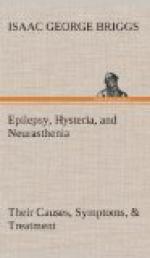Character is usually appraised as “good” or “evil” by the nature of a man’s actions, the assumption being made that he can control his impulses if he be so minded.
This is not so. “Good” and “evil” are only relative terms. What one man thinks “evil”, a second holds “good”, while a third is not influenced.
Now the performance of the act judged is directed by the performer’s brain, the constitution of which was pre-determined by the germ-plasm from which he arose, so that the basis of character is inherited.
The moral sense is the last evolved and least stable attribute of the last evolved and least stable of our organs, the brain; and brains are born, not made to order. To blame a man for having weak control—a sick will—is as unreasonable as to blame him for a cleft palate or a squint. The “good” people who jog so quietly through life little reck how much they owe their ancestors, from whom they received stability.
These tendencies represent the total material for building character. Training and environment can only nourish good tendencies and give bad ones no encouragement to grow gigantic.
If training and environment alone formed character, then children reared together would be of similar disposition; by no means the case. Similarly, if external influences altered inborn tendencies, then, not only would the evil man be totally reformed by strong inducements to virtue, but strong inducements to vice would lead totally astray the good man, for “good” is no stronger than “evil”, both being attributes of mind.
In mind as in body, from the moment he is conceived to the moment his dust rests in the tomb, man is directed by immutable laws, though he is not simply a machine directed by impulses over which he has no control. There is real meaning in “strong will” and “weak will” will being a tendency to deliberate before and be steadfast in action, a tendency which varies immensely in different people. The fallacy of “free will” lies in assuming that every one has this tendency equally developed, making character a mere matter of saying “Yes!” and “No!” without reference to the individual’s mental make-up.
Deliberate, persistent wickedness implies a strong will, just what neuropaths lack. A man of weak will can never be a very good nor yet a very bad man. He will be very good at times, very bad at times, and neutral at times, but neither for long; before sudden impulses, whether good or bad, neuropaths are largely powerless.
The many perversities of a neuropath are not deliberately put forth of his “free will” to annoy both himself and others, for the neuropath inherits his weak-control no less than his large hands.
Friends must remember they are dealing with a person whose nature it is to “go off half-cock”, and who cannot be normal “if he likes”. The neuropath, young or old, says what he “thinks” without thinking, that is he says what he feels, and acts hastily without weighing consequences.




